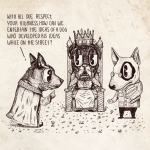1 John 4:9: By this the love of God is manifested in us, that God has sent His only begotten Son into the world so that we might live through Him. In this is love, not that we loved God, but that He loved us and sent His Son to be the propitiation for our sins. John Bunyan very honestly describes in his autobiography, Grace Abounding to the Chief of Sinners , how he was plagued by doubts for many... Read more




















